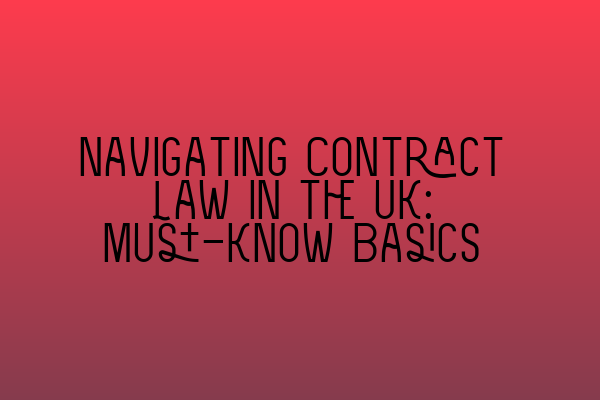Navigating Contract Law in the UK: Must-Know Basics
Contract law is an essential part of the legal system in the United Kingdom. Understanding the basics of contract law is crucial for anyone involved in business, whether you are a solicitor, a business owner, or an individual entering into an agreement. In this article, we will explore the must-know basics of contract law in the UK, providing you with valuable knowledge to navigate contracts with confidence.
What is a Contract?
A contract is a legally binding agreement between two or more parties. It outlines the rights and obligations of each party and can cover a wide range of transactions, from simple agreements to complex business deals. To be valid, a contract must meet certain requirements:
- Offer and Acceptance: There must be a clear offer made by one party and acceptance of that offer by the other party.
- Intention to Create Legal Relations: The parties involved must intend for the contract to have legal consequences.
- Consideration: Each party must provide something of value in exchange for the other party’s promise. This is known as consideration.
- Capacity: The parties entering into the contract must have the legal capacity to do so. For example, minors and those with mental incapacity may not have the legal capacity to enter into a contract.
- Consent: The parties must enter into the contract voluntarily and without duress or undue influence.
- Legality: The purpose of the contract must be legal and not against public policy.
Understanding these requirements is crucial to ensure the validity of any contract you enter into or advise on.
Types of Contracts
Contracts can take many forms, depending on the nature of the agreement and the parties involved. Some common types of contracts include:
- Express Contracts: These contracts are explicitly stated in writing or orally. The terms and conditions are clearly defined.
- Implied Contracts: Implied contracts are not explicitly stated but are inferred from the actions and conduct of the parties involved.
- Unilateral Contracts: In a unilateral contract, one party makes a promise in exchange for the other party’s performance of an act.
- Bilateral Contracts: Bilateral contracts involve a promise from both parties. Each party is obligated to fulfill their promises.
- Aleatory Contracts: Aleatory contracts are based on uncertain events. The performance of the contract depends on the occurrence of a specified event.
By understanding the different types of contracts, you can determine the appropriate approach for your specific situation.
Key Elements of a Contract
Contracts consist of various key elements that define their terms and conditions:
- Offer: This is a clear statement of the terms on which the party making the offer is willing to be bound.
- Acceptance: Acceptance occurs when the other party agrees to the terms of the offer.
- Consideration: Consideration is the value exchanged between the parties. It can be in the form of money, goods, services, or a promise to do or not do something.
- Conditions and Warranties: Conditions are essential terms that, if breached, can terminate the contract. Warranties are minor terms that are not central to the contract’s purpose but still hold importance.
- Performance: The parties involved must fulfill their obligations under the contract.
- Breach: A breach occurs when one party fails to perform their obligations as outlined in the contract.
- Termination: Contracts may be terminated in various ways, such as by agreement, frustration, or breach of contract.
By understanding these key elements, you can effectively navigate the terms and conditions of any contract.
Seeking Legal Advice
When dealing with contracts, it is always advisable to seek legal advice from a qualified solicitor. They can review the terms of the contract, ensure its validity, and provide guidance on your rights and obligations.
At SQE Contract Law, we offer expert legal services for contract law matters. Our team of experienced solicitors can provide you with the guidance and support you need to navigate the complexities of contract law in the UK.
For more information on other legal topics, consider reading our related articles:
- Mentorship for Aspiring Solicitors: Nurturing Talent in the Legal Field
- Legal Challenges and Pitfalls: Navigating the Complexities of the Legal System
- Mastering the Solicitor’s Path: Prepare for the Journey Ahead
- The Benefits of Becoming a Solicitor: A Rewarding Career
- Law School in the UK: Your Guide to Starting Your Legal Journey
Contract law in the UK can be complex, but with the right knowledge and legal support, you can navigate it successfully. By understanding the basics of contract law, you can protect your interests and ensure that your agreements are legally sound.
This article is for informational purposes only and does not constitute legal advice.
